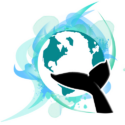Hi everybody, my name is Anaïs Remili, and I am 30 years old. This post explains how I became a whale researcher, got my PhD, and how I started Whale Scientists. You can also find my website here: https://anaisremili.com/

From France to North America
I was born and raised in the French Alps. I have always been passionate about whales and got obsessed with killer whales as a kid. Using Google in its early days, I kept searching for orcas online and learning everything about them.
After graduating from high school in France, I went through a one-year exchange program in an American high school in Michigan, where I developed my English skills. When I got back to France, I started my bachelor’s in ecology called “Biology of the Organisms and Populations” in Lyon.
After completing my undergrad, I entered the MER (Marine Environment and Resources) master program. It is an Erasmus Mundus joint program that involves universities from multiple countries. The goal is to change universities each semester to get the most out of each country/university. As a result, I spent a semester in Bordeaux (France), then a semester in the Basque Country in Spain, and then a year in Liège, Belgium.
Research experience
Italian whales and dolphins
During my undergrad and grad studies, I got some experience with marine mammals. I spent three months in Savona, Italy, doing an internship with the Cetasmus program at CIMA Fondazione. It allowed me to be at sea, as a marine mammal observer, and help with the ongoing Cetasmus research projects: 1) Habitat distribution of Ligurian Sea marine mammals, 2) Impacts of whale watching on cetacean behavior, and 3) their Ziphius project to help understand the distribution and population structure of Cuvier’s beaked whales.
Whale Cell Cultures in Kentucky
I grew my own whale cells in the USA in Dr. John P. Wise Sr.’s lab at the University of Louisville. I spent a summer learning at his side and testing the effect of chromium on whale cell mitosis. I got to sample humpback whales in the Gulf of Maine with Dr. Wise. It was the most surreal experience because the whales were singing under our boat, and it was during the 2017 summer eclipse.
Humpback whales from Antarctica
I secured my master’s thesis by talking to our marine mammals professor at the University of Liège, Dr. Krishna Das. I was a huge fan of her research and had read all her publications before asking her to do my thesis under her supervision. My thesis focused on the feeding ecology and chemical contaminants of two different populations of humpback whales from Antarctica. I got to spend time at Dr. Adrian Covaci’s lab in Antwerp, Belgium. There, I extracted and quantified the contaminants in humpback whale blubber samples with Dr. Malarvannan. After two years, I graduated with my master’s, top of my class.
During my master’s years, I also helped my professors with various projects when I had free time. I got lucky to help with hake surveys in Spain and porpoise and seal necropsies in Belgium at the veterinary school of Liège. I also started to attend conferences during my master’s program, and I loved meeting new passionate people in different parts of the world.
From humpbacks to killers… PhD at McGill
I completed my PhD at McGill University in Montréal, Canada (2019-2023). My work focuses on the impact of feeding ecology variation on contaminants (persistent organic pollutants) levels in North Atlantic killer whales. I worked under the supervision of Dr. Melissa McKinney from McGill University and Dr. Robert Letcher from Environment and Climate Change Canada. They had been my science idols for a long time.
This PhD so far allowed me to work in Ottawa and Montréal. I also got to travel to Japan, Norway, Spain, Belgium, Ireland, and Iceland…

I finished my PhD in September 2023. I am now a postdoctoral researcher at McGill until June 2024, and then in Vancouver, Canada. I still work on the ecology and toxicology of killer whales.
Scientific Communication and my role in WS
I am very invested in scientific communication. I got the idea of starting Whale Scientists years ago but never felt credible and knowledgeable enough to go through with it. We will talk about impostor syndrome in a dedicated post when I find a way to put words on it. I shared this idea with Naomi a while back, and it took us four years to get started. We are super happy we went through with it, though, and we hope you will like our project as much as we do!
My role in Whale Scientist involves reaching out and communicating with partners and authors; writing posts; finding new ideas; editing (I edit ALL the posts); managing social media platforms; optimizing our SEO; securing funding, and illustrating our posts. I turned Whale Scientists into my main hobby and spent long evenings/weekends on the platform trying to improve it.
These days, I like to focus on my visual skills, and I practice making infographics here and there. It is a lot of fun.
How I met Naomi, co-founder of Whale Scientists

Naomi and I met in the summer of 2016 in Savona, Italy. We both did the Cetasmus internship on marine mammals in the Pelagos Sanctuary, a marine protected area in the Mediterranean Sea. Naomi and I were roommates during that summer. We had countless experiences together, traveling around Northern Italy and France. Days at sea were challenging but rewarding, and we spent the summer hanging out with dolphins and whales. We got close and started to talk about this blog years ago.
